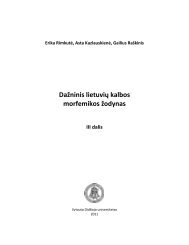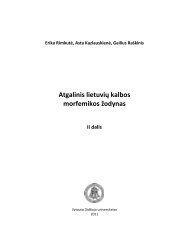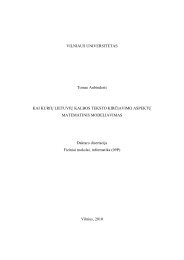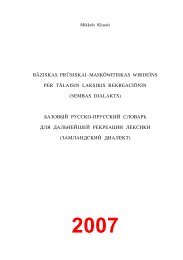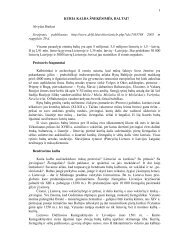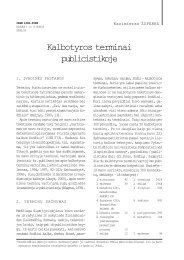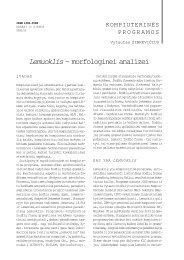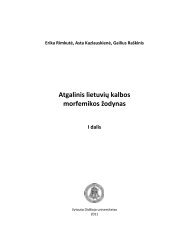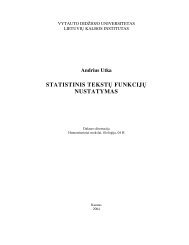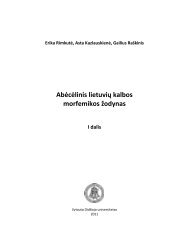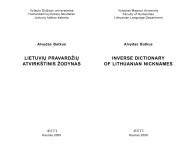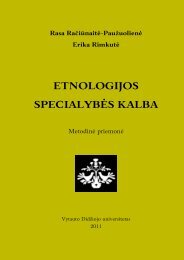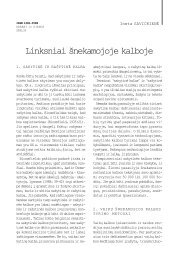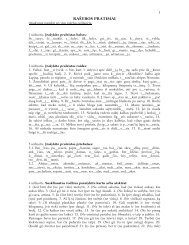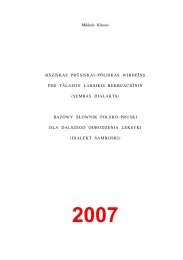HISTORICAL GRAMMAR OF OLD PRUSSIAN
HISTORICAL GRAMMAR OF OLD PRUSSIAN
HISTORICAL GRAMMAR OF OLD PRUSSIAN
Create successful ePaper yourself
Turn your PDF publications into a flip-book with our unique Google optimized e-Paper software.
<strong>HISTORICAL</strong> <strong>GRAMMAR</strong> <strong>OF</strong> <strong>OLD</strong> <strong>PRUSSIAN</strong><br />
‘feather-bed’ (PEÞ III 292), sompisinis (E) ‘bread of coarse-ground flour’<br />
(PEÞ IV 140) etc19 .<br />
There are also derivatives with a suffix *-în in Prussian, e.g.: adj.<br />
alkîns (III) ‘hungry’ (PEÞ I 66), subst. acc. sg. kaimînan (III) ‘neighbour’<br />
(PEÞ II 75 f.), subst. seimîns (III) ‘family’ (PEÞ IV 93).<br />
* 57. Pr. suf. -ain- and -ein- were used to derive adjectives and<br />
substantivized adjectives, e.g.: deynayno (E) ‘morning star’ = *deinain¯É<br />
< adj. (fem.) *deinain` ‘daily’ (PEÞ I 188), g[elta]ynan (E galatynan)<br />
adv. ‘yellow’ = *geltainan (PEÞ I 344 f.), s[u]weynis (E seweynis) ‘piggery’<br />
= *suvein- (PEÞ IV 103 f., cf. Ambrazas DDR II 57), adv. angstainai<br />
(III) ‘early’ and angsteina ‘idem’ (PEÞ I 78 f.).<br />
Note: The Germans (resp. Germanized Prussians) could confuse<br />
spellings -ain- and -ein- in Prussian texts (especially in Catechisms).<br />
* 58. Suf. -ûn was used to form substantives from verbs and (substantivized)<br />
adjectives, cf. Pr. acc. maldûnin ‘youth’ < Pr. adj. *maldûna-<br />
‘youthful’ (PEÞ III 104 f.), Pr. percunis (E) ‘thunder’ < Balt. adj. masc.<br />
*perkûnas ‘related to *perkus “oak-tree” ’ (PEÞ III 265), Pr. alkunis (E)<br />
‘elbow’ = *alkûnis < Balt. adj. *alkûna-/*elkûna- ‘having a bend’ (PEÞ I<br />
67 f.), Pr. waldûns (pl. weldûnai) (III) ‘inheritor’ < Pr. *veldûnas ‘idem’ <<br />
Pr. *veld- ‘inherit’ (PEÞ IV 229), Pr. malunis (E) ‘mill’ < Pr. *malûnas<br />
‘idem’ < Polish m_ lyn + Pr. *mal- ‘to mill’ (PEÞ III 107 f.) 20 .<br />
a borrowing from Prussian because of irregular correspondence of tone in Pr. k`ima(luke) ‘visits’<br />
(= Pr. caymis E = acute *kaým(a)s, not circumflex o coymis! – see * 4 and ftn. 2) vs. Lith. acute<br />
k³imas ‘village’ (not cirkumflex as in ki…emas = Latv. cÑems, i.e. not o kaµmas!). As for the said<br />
“centum” exception in general, it may have been not an exception but a result of borrowing from<br />
Germanic (cf. Gothic above) into Baltic.<br />
Nevertheless some nouns, derived with a suf. -in, seem to be of archaic Baltic-Slavic origin,<br />
e.g. part of those which mark male animals in respect to basic feminine appellative, cf. Pr. (E)<br />
masc. awins ‘ram’, Lith. masc. ãvinas ‘idem’, Latv. masc. $uns ‘idem’, OSl. ovünú ‘idem’ vs. Lith.<br />
fem. avÑs ‘sheep’, OLatv. fem. avs ‘idem’, OSl. “dimin.” ovü-ca ‘idem’. – L.P.<br />
20 Such words as Pr. waldûns (III) show that suf. *-ûn was still productive in Prussian, in spite<br />
of earlier derivatives of Common Baltic past, as e.g. Pr. percunis (E) – cf. Lith. perk«nas, Latv.<br />
dial. p@&çrk°uns, or Pr. alkunis (E) – cf. Lith. alk«në, Latv. ‡elkuonis @ – L.P.<br />
31



